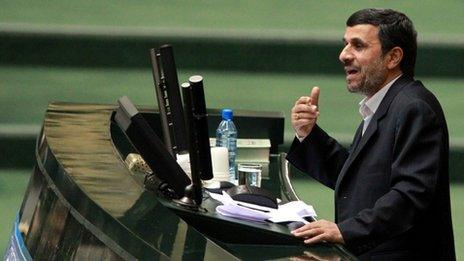The drum beat of an unwanted war
- Published
- comments

The Israeli foreign minister's visit to Washington comes amid heightened tensions with Iran
Israel's foreign minister is in Washington. There's a lot to talk about.
Politicians and diplomats can be surprisingly coy about asking direct questions, even in private. So, "are you going to plunge us into a war in an election year?" may remain unspoken.
The drumbeat of war has grown louder in the past few days.
The Washington Post reported, external that US Defence Secretary Leon Panetta believes Israel could attack Iran as early as this spring.
Mr Panetta did not deny the story.
This was reinforced by a fascinating and incredibly detailed article, external by the Israeli journalist Ronen Bergman.
"After speaking with many senior Israeli leaders and chiefs of the military and the intelligence, I have come to believe that Israel will indeed strike Iran in 2012," Mr Bergman concludes.
This is the argument: there is less than a year to stop Iran moving into "the immunity zone".
After that, it will have passed the critical point when an attack would seriously set back its nuclear programme.
'Extreme anxiety'
This puts President Barack Obama on the spot, particularly in an election year.
Cliff Kupchan of the Eurasia group, which assesses international risks, has been in Israel recently and thinks the mood has changed, particularly because the left no longer opposes an attack.
"I worked in the Clinton administration - if I was inside this White House I would be viewing this with extreme anxiety," Mr Kupchan says.
Barack Obama: "We will do everything we can to prevent Iran from getting a nuclear weapon"
"The Israelis, as they told me, are not going to give the US administration guarantees that they will give the US prior knowledge before they make an attack.
"Now if I was making policy and I knew that vital US interests might get sucked in, I would be losing some sleep."
He goes on that the US would be sucked into any war, but Mr Obama could not show outright opposition to an Israeli strike, even if he felt it.
"Politically, I don't think he can do that," Mr Kupchan says. "He can say we did not participate, we did not have knowledge beforehand, we did not approve, but I think he would have to at least go along with it, possibly provide rhetorical support.
"He would be in a very difficult political situation, given where Congress is, and during an election year Obama needs the Jewish vote, needs to appear hardline. It would be very hard for him to do anything but implicitly condone the attack."
President Obama has gone out of his way to say that Israel has not made a decision and he is working in lockstep with them. But there are also reports he's privately urged them not to attack.
Saying no to Israel?
The Republican presidential candidates have attacked him, external for not being close enough to Israel.
On the Republican right it is a given that America should be Israel's closest and strongest ally. To not give the country full support is seen as akin to being un-patriotic and un-American.
Michael Scheuer, the former senior CIA agent in charge of the Bin Laden tracking unit, is a maverick in Washington's foreign policy establishment, external. He doesn't think the close relationship with Israel is in America's best interests.
But in an election year, he says, it would be a very courageous president who would dare to distance himself from Israel.
"I think it is very difficult for an American president, of either party, to say no to Israel, Mr Scheuer says. "He's a political animal and will probably go along with Israel."
And at the end of the day it doesn't make any difference, he says.
"Because in the Persian world, the Muslim world, in the Arab world, if Israel attacks, unless we respond with a declaration of neutrality or a condemnation and a freezing of relations with Israel, they will assume America gave Israel the green flag."
Some think that logic means the White House may have to accept the inevitable and take action. Professor Matt Kroenig, who worked on the Middle East and nuclear issues in the Department of Defense, says there are only a number of ways the Iranian nuclear issue is going to play out.
"In some ways the Israel military option is the worst," Mr Kroenig says. "They don't have the same capabilities, they wouldn't inflict the same kind of lasting damage on Iran's programme as if the US took action."
"But you would get all the downside risk in terms of spikes in oil prices and Iranian retaliation, so I think the White House is doing its best to restrain Israel.
"We should pursue diplomacy, pursue sanctions, try to get a deal. But, in the end, faced with a choice between living with a nuclear-armed Iran and a strike, a US military strike would be the least bad option. A bad option, but the least bad."
Not everyone thinks that noise we are hearing is the drum beat of war. Some think it is a very precise, very calculated sabre rattling.
Cliff Kupchan told me Israel knows how to play American politics like a violin and this is all about sanctions. Perhaps it is no coincidence that President Obama has just signed more sanctions, although they look to me more symbolic than regime-threatening.
Some think it is to force Iran to the negotiating table. Others argue the talk of war, external is to make those countries who are reluctant to impose sanctions take a long hard look at the alternatives.
But only a minority take this view now.
What is not in any doubt is that a war around Easter would change the dynamic of the presidential election and face Mr Obama with some very unpalatable choices.
- Published7 February 2012

- Published6 February 2012
- Published30 March 2015
